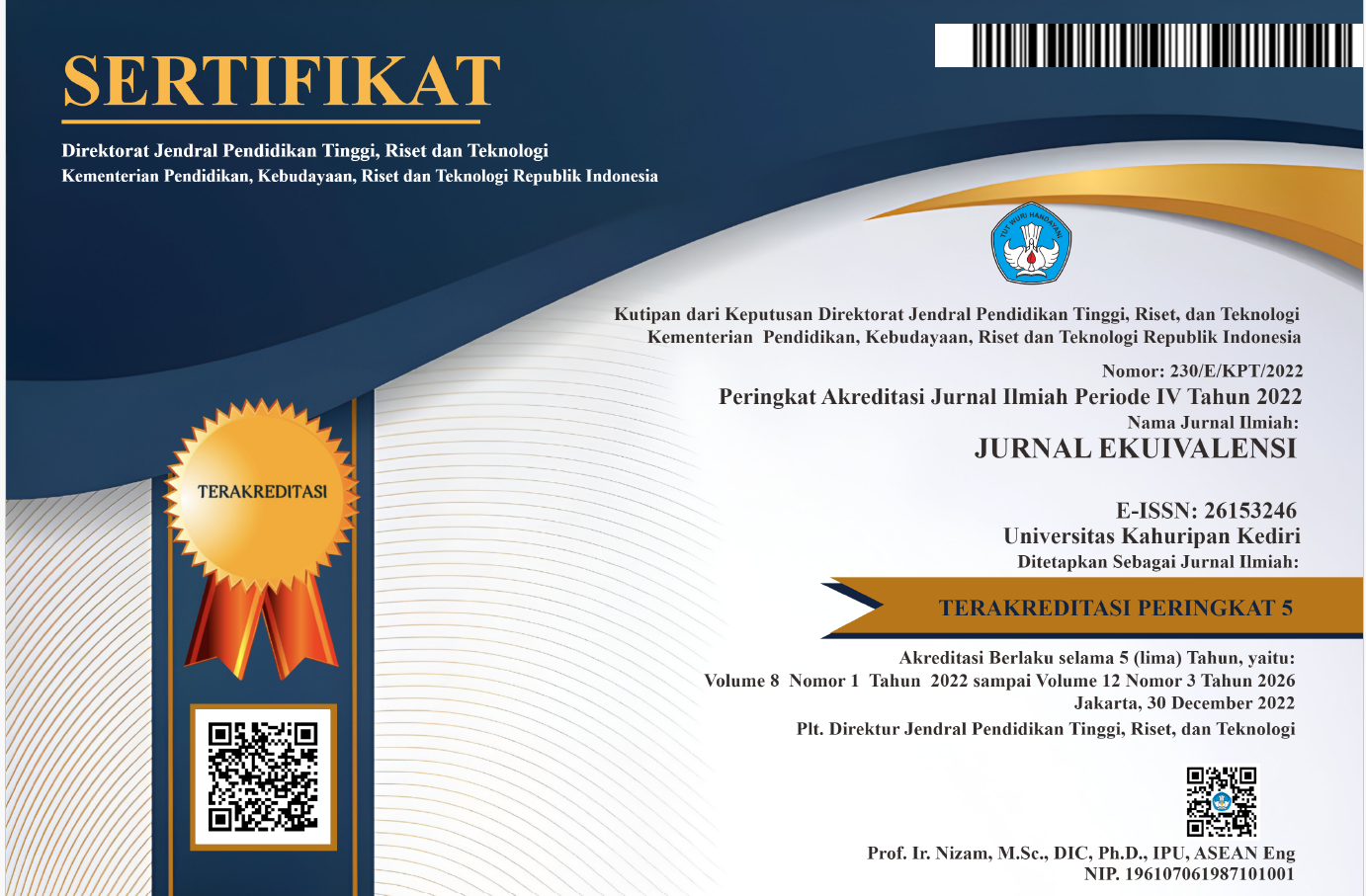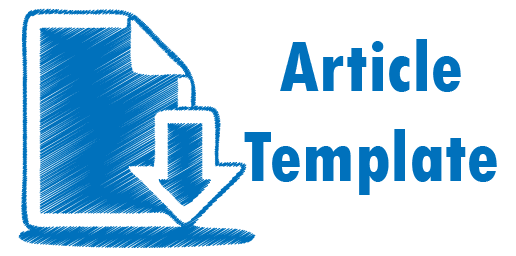Profesionalisme Auditor Pada Auditor Junior dan Auditor Senior
(Studi Kasus Pada KAP Di Surabaya)
DOI:
https://doi.org/10.51158/ekuivalensi.v8i2.839Abstract
Abstrak
Profesionalisme merupakan suatu persoalan penting dalam menjalankan pekerjaan audit senior dan audit junior, karena profesionalisme berpengaruh dalam hasil audit dan kualitas audit. Realita bahwa terdapat beberapa persoalan mengenai pelanggaran prosedur audit yang menunujukkan bahwa profesionalisme belum digunakan maksimal. Penelitian ini bertujuan untuk memaknai profesionalisme auditor senior dan auditor junior dalam mengaudit laporan keuangan. Penelitian dilakukan dengan menggunakan pendekatan fenomenologi. Pengumpulan data menggunakan wawancara serta dianalisis berdasarkan teori fenomenologi . Hasil penelitian menunjukkan bahwa auditor senior memiliki profesionalisme yang tinggi karena auditor senior mempunyai pengalaman, pendidikan, pengetahuan yang mumpuni. Auditor junior kurang dalam profesionalisme hal ini terlihat dalam pengambilan keputusan yang kurang tegas sehingga harus didampingi oleh auditor senior.
Keyword:profesionalisme, auditor senior, auditor junior, hasil audit
Abstract
Professionalism is an important doing audit work, because professionalism affects in audit results and audit quality. Reality there are several problems of audit procedures so that professionalism has not been optimally. This study aims to interpret the professionalism of senior auditors and junior auditors in auditing financial statements. The research analysis using a phenomenological aaproach. Data collection using interviews and analyzed based on phenomenological theory. The results showed that senior’s auditors had high professionalism because senior’s auditors had qualitified experience, education knowledge. Junior auditor’s had weaknes professionalism, this can be seen in less assertive decisions making, so the must be accompanied by seniors auditor
Keyword: profesionalism,seniors auditor, junior auditor,audit resul
References
DAFTAR PUSTAKA
Adhikari, P., & Jayasinghe, K. (2017). ‘Agents-in-focus’ and ‘Agents-in-context’: The strong structuration analysis of central government accounting practices and reforms in Nepal. Accounting Forum, 41(2), 19(96-115). https://doi.org/https:// doi.org/10.1016/j.accfor.2017.01.001
Agoes, S. (2012). Petunjuk Praktis Pemeriksaan Akuntan oleh Akuntan Publik. In Salemba Empat (Vol. 1). Jakarta.
Boiral, O., Heras-Saizarbitoria, I., & Brotherton, M.-C. (2019). Professionalizing the assurance of sustainability reports: the auditors’ perspective. Accounting, Auditing & Accountability Journal. https://doi.org/https://doi.org/10.1108/AAAJ-03-2019-3918
Broberg, P., Umans, T., Skog, P., & Emily, T. (2014). Auditors’ professional and organisational identities and perceived commercialisation in audit firms. European Accounting Association 37th Annual Congress, Tallinn, Estonia, May 21-23, 2014, 25(374-399). https://doi.org/https://doi.org/10.1108/AAAJ-02-2014-1607
Broberg, P., Umans, T., Skog, P., & Theodorsson, E. (2018). Auditors’ professional and organizational identities and commercialization in audit firms. Accounting, Auditing & Accountability Journal, 31(2), 25(374-399). https://doi.org/DOI 10.1108/AAAJ-02-2014-1607
Brown, V. L., Gissel, J. L., & Gordon Neely, D. (2016). Audit quality indicators: Perceptions of junior-level auditors. Managerial Auditing Journal, 31(8/9), 31(949-980). https://doi.org/https://doi.org/10.1108/MAJ-01-2016-1300
Creswell, J. W., & Poth, C. N. (2016). Qualitative inquiry and research design: Choosing among five approaches. Sage publications.
Edgley, C., Sharma, N., & Anderson-Gough, F. (2016). Diversity and professionalism in the Big Four firms: Expectation, celebration and weapon in the battle for talent. Critical Perspectives on Accounting, 35, 21(13-34). https://doi.org/https://doi.org/10.1016/j.cpa.2015.05.005
Evetts, J. (2013). Professionalism: Value and ideology. Current Sociology, 61(5–6), 18(778-796). https://doi.org/https://doi.org/10.1177%2F0011392113479316
Friedson, E. (2001). Professional Knowledge and Skill Professionalism: The Third Logic (pp. 17–35). Cambridge: Polity, 268.
Gendron, Y., Suddaby, R., & Lam, H. (2006). An examination of the ethical commitment of professional accountants to auditor independence. Journal of Business Ethics, 64(2), 36(169-193).
Gleeson, D., Davies, J., & Wheeler, E. (2005). On the making and taking of professionalism in the further education workplace. British Journal of Sociology of Education, 26(4), 15(445-460). https://doi.org/https://doi.org/10.1080/01425690500199818
Goldman, A., & Barlev, B. (1974). The auditor-firm conflict of interests: Its implications for independence. The Accounting Review, 49(4), 17(707-718).
Hall, R. H. (1968). Professionalization and bureaucratization. American Sociological Review, 33(No. 1 (Feb., 1968)), 92–104.
Herawaty, A., & Susanto, Y. K. (2009). Pengaruh Profesionalisme, Pengetahuan Mendeteksi Kekeliruan, dan Etika Profesi Terhadap Pertimbangan Tingkat Materialitas Akuntan Publik. Jurnal Akuntansi Dan Auditing Indonesia, 13(2), 9(211-220).
Huserl, E. (1960). Cartesian Meditation. The Hague: Martinus Nijhoff.
Knechel, W. R., Niemi, L., & Zerni, M. (2013). Empirical evidence on the implicit determinants of compensation in Big 4 audit partnerships. Journal of Accounting Research, 51(2), 38(349-387). https://doi.org/https://doi.org/10.1111/1475-679X.12009
Largay, J. A. (2002). Lesson From Enron. American Accounting Association, Vol. 16 No, 3(153-156).
Le Bianic, T. (2003). Professionalism, the third logic: on the practice of knowledge. JSTOR.
Legoria, J., Rosa, G., & Soileau, J. S. (2017). Audit quality across non-audit service fee benchmarks: Evidence from material weakness opinions. Research in Accounting Regulation, 29(2), 11(97-108). https://doi.org/https://doi.org/10.1016/j.racreg.2017.09.001
Mataira, K., & Van Peursem, K. A. (2010). An examination of disciplinary culture: Two professional accounting associations in New Zealand. Accounting Forum, 34(2), 13(109-122). https://doi.org/https://doi. org/10.1016/j.accfor.2010.02.001
Mayangsari, S. (2003). Pengaruh Keahlian Audit dan Independensi Terhadap Pendapat Audit: Sebuah Kuasieksperimen. The Indonesian Journal of Accounting Research, 6(1).
Palmer, K. N., Ziegenfuss, D. E., & Pinsker, R. E. (2004). International knowledge, skills, and abilities of auditors/accountants: Evidence from recent competency studies. Managerial Auditing Journal, 19(7), 13(889-896). https://doi.org/https://doi.org/10.1108/02686900410549411
Perera, H., Cummings, L., & Chua, F. (2012). Cultural relativity of accounting professionalism: Evidence from New Zealand and Samoa. Advances in Accounting, 28(1), 8(138-146). https://doi.org/https://doi.org/10.1016/j.adiac.2012.03.006
Reynolds, M. A. (2000). Professionalism, ethical codes and the internal auditor: A moral argument. Journal of Business Ethics, 24(2), 115–124.
Saiewitz, A., & Kida, T. (2018). The effects of an auditor’s communication mode and professional tone on client responses to audit inquiries. Accounting, Organizations and Society, 65, 10(33-43). https://doi.org/https://doi.org/10.1016/j.aos.2017.10.002
Siahaan, V. D. (2010). Pengaruh Profesionalisme Terhadap Komitmen Organisasi Dalam Upaya Meningkatkan Kinerja Auditor (Studi Pada Kantor Perwakilan BPK-RI Provinsi Aceh). Jurnal Telaah Dan Riset Akuntansi, 3(1), 18(10-28).
Sidaway, S., De Lange, P., Bouilheres, F., & Sangster, A. (2013). Professional accounting body affiliation: Shifting priorities in the transition from student to practitioner. Accounting Education, 22(6), 12(605-617). https://doi.org/https://doi.org/10.108 0/09639284.2013.847324
Svensson, L. G. (2006). New professionalism, trust and competence: Some conceptual remarks and empirical data. Current Sociology, 54(4), 14(579-593). https://doi.org/10.1177%2F0011392106065089
Syailendra, G. D., & Hamidah, H. (2019). MAKNA PROFESIONALISME BAGI DIRI PETUGAS PEMERIKSA PAJAK. Jurnal Akuntansi Multiparadigma, 10(2), 20(241-261). https://doi.org/http://dx.doi.org/10.18202/jamal.2019.08.10014













